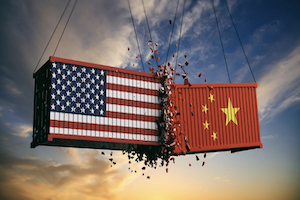Another China Competition Bill: The Future of Section 301 Exclusions

The Trade Act of 1974 grants the President broad powers to manage trade relationships with foreign countries. Section 301 of the act allows the President, acting through the United States Trade Representative (“USTR”), to impose retaliatory tariffs on imports from a country if the USTR determines that country’s economic conduct “is unreasonable or discriminatory and burdens or restricts United States commerce.”
Key Legal Developments in 2023 Concerning United States Customs and International Trade

By Adrienne Braumiller, Founding Partner Harold Jackson, Associate Attorney Gavin Andersen, Braumiller Consulting Trade Advisor Section 301 Tariffs on Chinese goods continues to be at the forefront of international trade relations with China and the United States. As part of the four-year review required under the relevant statute (19 USC § 2417), the United States Trade […]
Despite Geopolitical Tension…Can Robust Bilateral Trade Exist? Australia and China, a Good Example Perhaps

It’s a little awkward, but in fact, a reality in this day and age that bilateral trade between two countries who view each other as somewhat adversarial, can co-exist economically. As the world turns, so does global trade, take Australia and China for the shining example.
Buy American – Treatment of Preferences in the Federal Acquisition Regulations

This article provides an overview of federal procurement laws and how the Federal Acquisition Regulations (FAR) implement some of those commitments in government contracts. The FAR, found under 48 C.F.R. Part 25, comprises the list of rules governing procurement of products and materials by federal agencies for public use.
Using CBP’s Enforcement Statistics to Assess Forced Labor Risk in the Supply Chain

The U.S. continues to spearhead enforcement against imported goods that were made using forced labor, and public enforcement statistics can help your company assess risks of forced labor.
Driving You MAD – Customs Issues in Mergers Acquisitions & Divestitures

When one company buys another there are typically two ways the purchased company will be treated: (1) It will be incorporated into the parent company and will no longer exist as a separate entity. (2) It will become a separately incorporated subsidiary of the parent company and retain its IRS number.
Legal Framework Governing Foreign Direct Investment from the United States and Canada in Mexico

A large number of companies considering relocating their business abroad have turned their eyes to Mexico, which has become an attractive place for investors to relocate their business, mainly because it is close to the United States and Canada (nearshoring), the labor costs are relatively low, the availability of IMMEX (maquiladora) program, and because there is a preferential treatment to originating goods and foreign investments from the United States and Canada that are protected under the USMCA, among other factors.
Should You File a Prior Disclosure in 2023?

2023 is more than a brand-new year – it is an opportunity for your company to prioritize supply chain and customs compliance. For some companies, this means filing a prior disclosure with U.S. Customs and Border Protection (CBP). Companies that are frequent importers are seriously considering disclosing entry violations under the condition that Customs will not issue civil penalties against them.
Doing Business with China Continues to Get More Difficult for U.S. Companies

The year 2022 saw a substantial increase in export restrictions applicable to China. The U.S. and China are not only in a trade war but there is also an effort by the U.S. to (1) prevent development of supercomputers, semiconductors and related products and technologies, and (2) prevent use of forced labor – especially involving the Uyghur minority in the Xinjiang region.
China and India, A Year Later, Post Invasion, Still Walking the Tightrope With the U.S. as They Continue to Set Records in Trade with Russia

China’s trade with Russia hit a record $190 billion U.S. in 2022, key operative word “record.” China is setting a course to become Russia’s top trade partner and prove to the world just what the “no limits” partnership can produce. An additional “maybe some limits” friend to Russia among the world’s larger economies is India.
